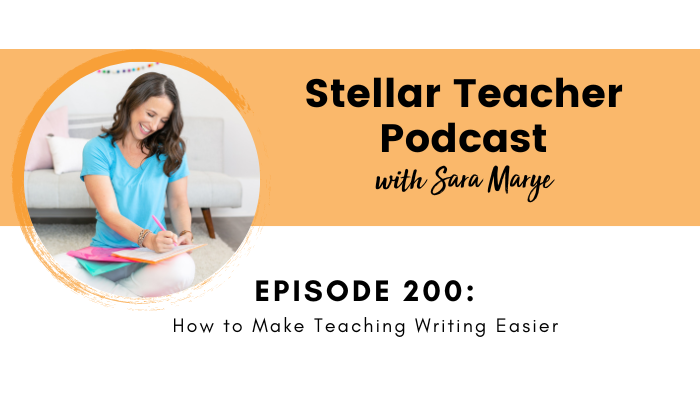
Click play below to hear how to make teaching writing easier:
Happy 200th episode, my friends! While I love reminiscing on milestone episodes, which I do at the beginning of this episode, I thought the best way to celebrate was to do what I started this podcast for. And that is to continue to support teachers in areas of struggle. After recently sending out a survey to my Stellar Teacher community, I once again saw the need for more support in the area of teaching writing. Struggling with this when I was a classroom teacher, I knew I needed to provide more support. So, in today’s episode, I’m sharing how to make teaching writing easier and less stressful for you this next school year.
I’ve found that if we as teachers don’t feel confident, knowledgeable, or enjoy what we’re teaching, then we tend to skip it, rush through it, or not put as much emphasis on the skills associated with the concept. After talking with teachers, writing is a struggle concept for many teachers. To help support teachers in this area, I’ve come up with four ways to make teaching writing easier and more enjoyable. One idea is more of a mental shift, while the other three are practical tips you can implement in your classrooms this fall.
When teachers struggle to teach certain concepts, they want easy, ready-to-implement routines and strategies they can incorporate into their daily schedules. Each of my four ways to make teaching writing easier can be implemented once school begins in the fall and will give you confidence and success when teaching writing!
In this episode on how to make teaching writing easier, I share:
- 4 ways to make teaching writing easier, less stressful, and more enjoyable for you
- How to think more positively about writing and the benefits that can have on your approach to teaching it
- 2 simple and easy routines to implement that will help you teach writing to your students
- Why teaching writing skills doesn’t just have to be taught during your designated writing time
Resources:
- Sentence Writing Routine Free Sample
- Paragraph Writing Routine Free Sample
- Join us for our Free Summer Book Study
- Sign up for my Private Podcast: Confident Writer Systems Series
- Check out the Stellar Literacy Collective Membership
- Check out my Free Literacy Workshop, The Time Crunch Cure: Create a Literacy Block That Fits it All In and Achieves More
- If you’re enjoying this podcast, please leave a review on Apple Podcasts!
Related episodes and blog posts:
- Episode 194, Must-Teach Writing Skills for the Start of School
- Episode 166, How Can I Help My Students Become Stronger Paragraph Writers?
- Episode 161, 5 Reasons Why You Need to Spend More Time on Sentence Writing in Upper Elementary
- Episode 155, Get INSPIRED To Teach Writing This Year!
- Episode 131, The #1 Mistake Upper Elementary Writing Teachers Make
Connect with me:
- Join my newsletter
- Shop my TPT store here
- Instagram: @thestellarteachercompany
- Facebook: The Stellar Teacher Company
More About Stellar Teacher Podcast:
Welcome to the Stellar Teacher Podcast! We believe teaching literacy is a skill. It takes a lot of time, practice, and effort to be good at it. This podcast will show you how to level up your literacy instruction and make a massive impact on your students, all while having a little fun!
Your host, Sara Marye, is a literacy specialist passionate about helping elementary teachers around the world pass on their love of reading to their students. She has over a decade of experience working as a classroom teacher and school administrator. Sara has made it her mission to create high-quality, no-fluff resources and lesson ideas that are both meaningful and engaging for young readers.
Each week, Sara and her guests will share their knowledge, tips, and tricks so that you can feel confident in your ability to transform your students into life-long readers.
Tune in on your favorite podcast platform: Apple, Google, Amazon, Spotify, Castbox, and more! If you’re loving this podcast, please rate, review, and follow!
Podcast (stellar-teacher-podcast): Play in new window | Download
Today is our 200th episode, which honestly is wild to me. But we’re gonna celebrate because this is a big milestone. Now I’m someone who loves to celebrate all things and reminisce and do all of those things when anniversaries and celebrations come up. So we’re going to take a little trip down memory lane here.
But I remember I started my podcast back in January 2021. And when I was thinking about starting the podcast, I had two really big fears that honestly almost prevented me from making this thing a reality. And the first was, I was really worried in my ability to release a new episode every single week. And I think in the three years that we’ve had the podcast, I’ve only missed one week. And there have been several seasons where we’ve actually released two episodes a week.
And I also remember, I was really worried about not having enough ideas for episodes. I was like, am I gonna run out of things to talk about? Yet here we are 200 episodes in and I still have a long list of things that I want to talk with you guys about.
And so much of the success of this podcast is really thanks to you guys. So many of you reach out to me and tell me how much the podcast has helped you increase your competence in teaching or it’s helped you expand your science of reading knowledge or how encouraged you feel after listening. And honestly hearing things like that make it really easy for me to sit down each week and record a new episode because I know how much value you get out of this.
So let me just say thank you so much for listening. Thank you for reaching out. Thank you for sharing how much the podcast means to you. And whether you are a new listener or you’ve listened to all 200 I am so glad that I get to connect with you and just talk literacy.
Now before we get into today’s episode, I do have two big favorite tasks of you, especially if you have been listening for a while. And I would really appreciate it, first of all, if you would consider leaving a review on Apple podcasts. Reviews and ratings really help other educators find the show. And if we’re going to keep doing this thing, we want to reach as many teachers as possible.
But also would you consider sharing this podcast with a teacher friend or someone that you think would benefit listening to it. Recommendations go such a long way. So send a text message to your team at school, share about it in your IG stories, spread the word so that way we can get even more listeners to tune in for the next 200 episodes.
Now, I always struggle with big milestone episodes like this, I remember planning out my 50th episode of my 100th episode. And I think that’s because I really want them to be special and significant, or really helpful and inspiring. But if I’m being honest, I didn’t have any great like earth shattering ideas that were better than what was already planned out on my regular content calendar.
So today we are going to talk about teaching writing. But before I get into that topic, let me just again, say thank you for being with me for the past 200 episodes. Thank you for tuning in. I love recording these episodes for you. And I really am excited to see what happens with this podcast for the next 200 episodes. All right, enough of the trip down memory lane here and the celebration and the reminiscing. Let’s jump into today’s episode.
So a few months ago, we sent out a survey asking teachers in our audience, what topics would be the most helpful for them to listen to this summer as they start to think about the next school year. And one topic that kept coming up over and over was writing Surprise, surprise. Teachers would ask how to find time to teach writing, how to enjoy teaching writing, how to get their kids to enjoy teaching, writing, what they should actually teach during writing.
And so many of the comments really had something to do with the idea that you know, teachers don’t feel like they know how to teach writing, and therefore they don’t feel competent teaching it which means they ultimately avoid it. And you might be nodding your head you’re like Yep, that’s me. That’s me.
It was totally me when I was in the classroom. I felt all of those things and I know I’ve shared this before but when I first started teaching writing, it was one of my least favorite things to teach. But writing doesn’t have to be challenging. And so today, I am going to share four things that you can do this next school year to make teaching writing easier for you and less stressful and hopefully more enjoyable.
Now, you don’t have to put all four ideas in place. But hopefully, you’ll get one or two ideas that really will ease the burden of teaching writing for you this next year.
So the first thing that you really need to do if you want teaching writing to feel easier, is you have to remove your personal feelings about teaching writing. And, you know, if you want writing to be easier then you really have to make a mental shift, and allow yourself to think it will be easier.
You know, if you concentrate on things like, I don’t like teaching, writing, I don’t know how to teach writing, my students don’t like to write, it really doesn’t matter what other actual concrete steps you take, if you are going to allow the negative thoughts around writing to roll around in your mind, then teaching writing is going to continue to be hard. So really, it starts with us making a mental shift.
Now, I’m not going to tell you to embrace you know toxic positivity and falsely tell yourself things like I love teaching writing, you know, if that’s not what you really believe, then trying to convince yourself of that isn’t really going to work. But you can start to shift the story that you tell yourself about writing.
So you can start to allow thoughts like I am learning how to be an effective writing teacher, I’m going to try some new things that could make writing easier, or I’m open to changing my mind about how I feel about teaching writing. Thinking about those thoughts are much more open, they’re expansive, and they allow space for the ease to come through.
And a few years ago, I know I’ve talked about this on some past episodes, but I got to work with a life coach that was really, really helpful with productivity. And a lot of it came down to my mindset. And she just gave me a ton of mindset shifts that I could really work on. And one of the things that she pointed out to me is how I have a tendency to want to jump to worst case scenarios, or I spend a lot of time really thinking about sort of the the worst case option.
And I never give my brain any airtime to consider the best case scenario or a possible really positive solution. And that sort of thing that she pointed out to me, I think about that now all of the time. And anytime I find myself now thinking about either something really negative, or the worst case scenario, I have to stop and remind myself it’s like, okay, this is one option. But that’s not a guarantee, like there are other options out there. And I tried to balance my airtime in my brain with positive scenarios as well.
And so I think the same is true with us teaching writing, you know, if the if the only thing you’re telling yourself is teaching writing is hard, my students don’t like it, I’m not a good writing teacher, you are not giving yourself any space to cultivate any of those positive or productive thoughts to take root. So just start to allow yourself to consider that writing could feel easy and fun for you this next year.
Okay, so while that probably is one of the most important things you can do, I know it doesn’t feel very practical. So I do have three really practical things that you can do that will make teaching writing easier this next year.
And so the next one is to implement writing routines. I think that, you know, putting routines in place helps anything become easier. You know, if we want something to feel easy, we need to have a system or routine in place, because that is going to take the guesswork out of what you should be teaching or how you should be teaching it.
I think so much of the mental stress and writing comes from not knowing how to use your writing time. So make some decisions ahead of time, put some writing routines in place, and then let the routines do the heavy lifting and the work throughout the year.
And two routines that I’ve talked about before on the podcast. And these are two routines that we really love to support our members with inside the Stellar Literacy Collective. But that is to put a daily sentence writing routine in place, where each day of the week students engage in a different sentence writing activity, maybe they are unscrambling a sentence or combining sentences or expanding a sentence.
But the daily task of you know, whatever the sentence level activity is, is going to help build their knowledge and understanding of sentence structure. And it’s also going to give them practice with one of the most foundational writing skills, sentence writing. And it’s also a really easy way to bring in, you know, teaching grammar and some of those other concepts as well. So that is one routine that I think is really important to have in place.
And then another routine that you can put in place is a weekly paragraph writing routine, where each day of the week students will take one small step toward creating a paragraph. And if you put both of these routines in place, you will see growth from your students.
One of our members, Laura shared how the Paragraph Writing routine has really helped her struggling writers because it eliminated the overwhelm. It broke up the writing process into small steps that they took each day that seemed really, really manageable for them. And then another one of our members, Monica shared that after using our sentence writing routine for just six weeks, her students revising and editing scores increased by 15%.
So if you want to make teaching writing easy, put routines that work in place in your classroom, and like I said, let the routines do the hard work for you.
Another thing that you can do to really make teaching writing easier is to teach in bite sized objectives. Again, I think part of the reason why teachers and students get so frustrated with writing or they don’t enjoy writing is because that we are trying to do too much in the time that we have, we are trying to teach too much. And we’re trying to have our students write too much.
You know, whenever I talk about writing, I like to remind teachers that we need to take the approach of we have to slow down so we can speed up. And one of the things that you can do to slow down with your writing instruction is to really teach in bite sized objectives. And the bite size objective is just a really small objective that, you know, it really can’t be broken down any further.
Some examples are you know, instead of trying to teach your students revision skills or the revision process. I know like when I started teaching writing, I would introduce revision using the arms acronym and I would try to have my students add and remove and modify and substitute all at the same time. That is way too big and way too overwhelming.
So instead of trying to approach revision from this big picture perspective, you simply teach them one small revision strategy, like how to improve word choice, and you let them practice that for a while. And then you introduce another bite sized objective. It’s something small that your students can experience success with.
Another example would be you know, rather than trying to have your students write an entire paragraph or essay, you simply focus on writing a topic sentence, and you model to them what that topic sentence looks like you give them practice with it, it’s very small, it’s very manageable, and it’s something that they can experience success with.
And I think teaching writing through bite size objectives works for a few reasons. They’re easier for you to teach, because you’re really just teaching in one small part. So it is less overwhelming for you. It’s easier for students to master the objective, because it’s just again, one small task in the writing process.
But teaching in this way, is really going to eliminate overwhelm. And I think when students don’t enjoy writing, because they don’t understand how to do it, they don’t feel successful with it, ultimately, because they have this sense of overwhelm. Because we are asking, oftentimes our upper elementary students to write five paragraph essays, when they are still struggling to write at the sentence level. So teaching in these small bite size objectives removes the overwhelm, which can really help students feel more competent.
So you know, don’t feel like you need to teach a giant writing concept at one time, but really think about, okay, how can I break this down into smaller segments and just tackle it one task at a time.
And I also think it’s really important for teachers, especially in upper elementary to remind yourself that if your goal for your writing block is simply to focus on getting your students to write a single sentence really, really well, that is okay, especially at the start of the year.
You know, if your students can understand how to put that sentence together, and they can produce a really strong sentence, that is going to be so much more beneficial to them, than having them spend their time struggle through writing an essay, that they never finish, and doesn’t end up being that good. So bite sized objectives is the way to go, especially with writing.
And then the final thing that you can do to really make teaching writing easier, is to expand your writing instruction to other parts of your day. I think another thing that stresses teachers out when it comes to writing is having to fit all of your writing lessons into your designated writing time, which is probably around 30 minutes, maybe 40, if you’re lucky.
So that means in 30 minutes, you are having to teach writing skills like grammar, sentence writing, revision skills, you’re also having to give students practice with those skills. You also have to teach things like the writing process, you have to have your students understand how to put together a coherent paragraph or essay. And then you have to teach them all of the different writing genres narrative, expository opinion so on and so on.
It really can feel like a lot to squeeze in to a short amount of time. So don’t put that pressure on yourself. Don’t tell yourself that the only time you can teach writing is during your writing block. Because here’s the truth. Writing happens in every single subject. So use your entire day to support your writing objectives.
You know, you can focus on sentence structure and helping your students craft a strong sentence during science or social studies when your students are responding to questions. You can highlight the writing process and have your students brainstorm, outline, draft, revise and edit when they are summarizing a text during you know, your your reading time. You can incorporate sentence writing into your morning message or your morning work.
You know, get creative, I think we tend to want to put everything we teach into these boxes, and we want to teach things in isolation. But there is so much power if we allow ourselves to teach content out of the designated content blocks. So really start thinking about your entire day as an opportunity to teach writing.
Okay, so none of these things are very difficult, except maybe that first one with the mindset shift. But putting any one of these things in place next year really will make teaching writing easier. And if you do all four of them, I promise you’re gonna have a completely different experience with writing this next year as compared to how you did this last year.
So let’s just review four things that you can do to make teaching writing easier this next year. First of all, remove your personal feelings from your writing instruction. The second thing is to implement writing routines, I’d recommend starting with a sentence writing routine and a paragraph writing routine. We have free samples of both of those that I will link to in the show notes. Also, we want to teach writing and bite sized objectives. We want to expand our writing instruction into other parts of our day.
I hope that you found this episode helpful and hopefully hearing just these writing tips to get you excited for teaching writing this next year. And again, thank you for tuning in. Thank you for all of your support for the past 200 episodes. And don’t forget that we are still in the middle of our stellar teacher science of reading summer series, which means on Thursday, we’ve got a bonus episode that is going to dig into some aspects of the science of reading. I hope you tune in and I will see you then.


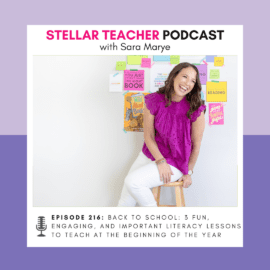
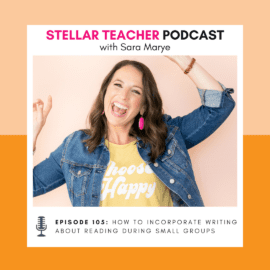
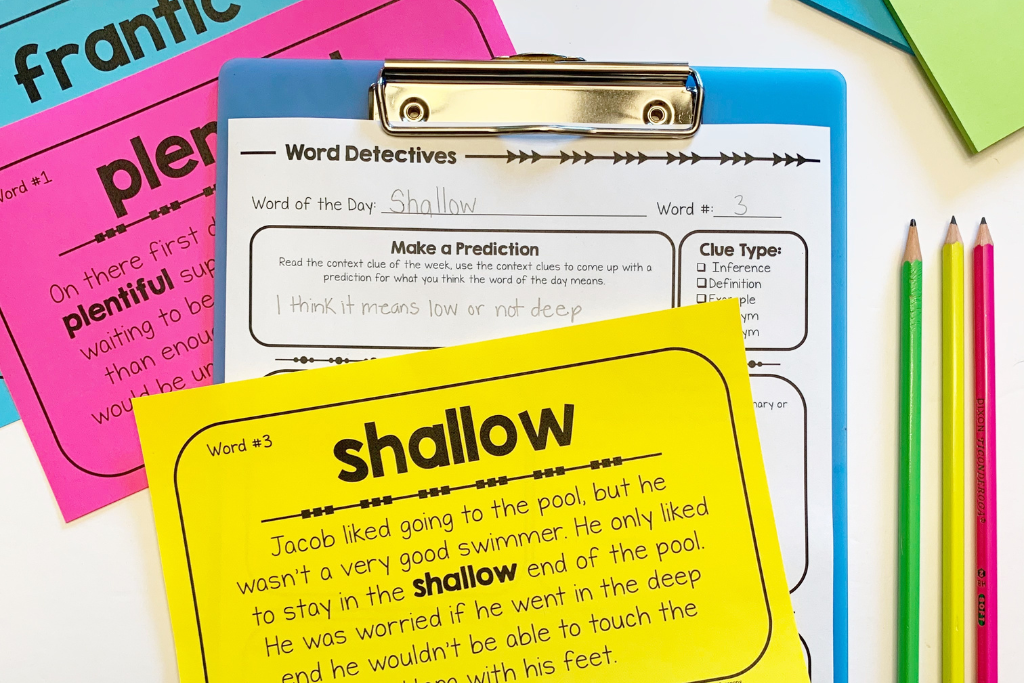

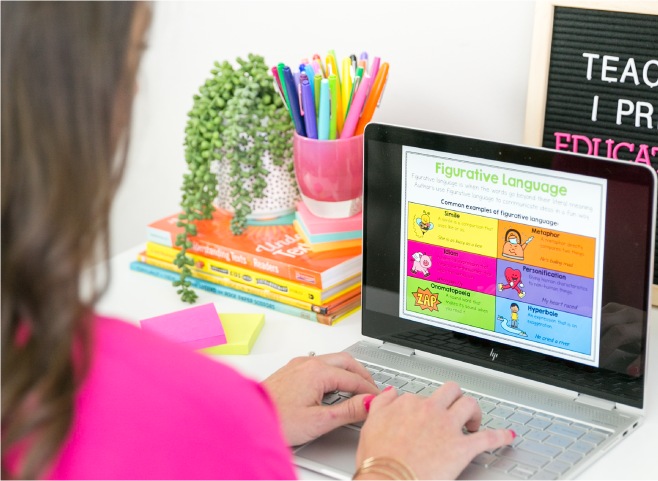

Leave a Comment
You must be logged in to post a comment.